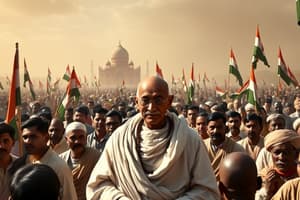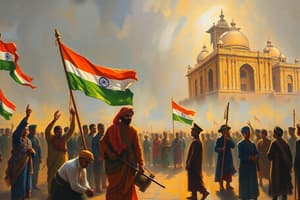Podcast
Questions and Answers
What historical event had a significant impact on the Indian economy and contributed to growing discontent with British rule?
What historical event had a significant impact on the Indian economy and contributed to growing discontent with British rule?
- Indian Mutiny
- World War I
- Partition of India
- The Great Depression (correct)
Which figure's philosophy of nonviolent resistance left an enduring legacy in India's independence movement?
Which figure's philosophy of nonviolent resistance left an enduring legacy in India's independence movement?
- Jawaharlal Nehru
- Subhas Chandra Bose
- Mahatma Gandhi (correct)
- Bhagat Singh
Which political party played a key role in the nationalist movement in India?
Which political party played a key role in the nationalist movement in India?
- Indian National Congress (correct)
- Aam Aadmi Party
- Shiv Sena
- Bharatiya Janata Party
What year did India gain independence from British rule?
What year did India gain independence from British rule?
Who authored the book 'India's Struggle for Independence'?
Who authored the book 'India's Struggle for Independence'?
Which historical movement led to the emergence of a new nation-state in India?
Which historical movement led to the emergence of a new nation-state in India?
Who led the Non-Cooperation Movement in India in 1920?
Who led the Non-Cooperation Movement in India in 1920?
What principle did Mahatma Gandhi employ during the independence movement?
What principle did Mahatma Gandhi employ during the independence movement?
Which political party served as a significant platform for the Indian independence movement?
Which political party served as a significant platform for the Indian independence movement?
Who were some of the notable figures associated with the Indian National Congress during the independence movement?
Who were some of the notable figures associated with the Indian National Congress during the independence movement?
What marked the beginning of the Indian independence movement?
What marked the beginning of the Indian independence movement?
What economic event influenced the Indian independence movement?
What economic event influenced the Indian independence movement?
Flashcards are hidden until you start studying
Study Notes
Nationalism in India: Historical Perspective
Our exploration into the complex tapestry of nationalism in India begins with an examination of key historical events and figures that shaped the country's independence movement.
Non-Cooperation Movement
The Non-Cooperation Movement, launched in 1920, marked a pivotal moment in India's fight for freedom. Led by Mahatma Gandhi, this nonviolent campaign aimed to persuade the British to relinquish control by encouraging Indians to withdraw cooperation from the colonial government, thereby undermining the British Raj's economic and social foundations.
Mahatma Gandhi
Mahatma Gandhi, the prominent figure of this period, employed the principle of satyagraha, or truth-force, a form of passive resistance rooted in nonviolence. This approach not only challenged British rule but also empowered the Indian people to engage in the liberation process as active participants.
Indian National Congress
The Indian National Congress, established in 1885, served as the preeminent political platform for India's independence movement. Notable figures such as Gandhi, Jawaharlal Nehru, and Subhas Chandra Bose, among others, advanced the cause of Indian nationalism within the Congress party.
Independence Movement
The Indian independence movement, marked by a series of both nonviolent and violent actions, can be traced back to the British East India Company's establishment in India in the late 17th century. The movement gained momentum over the course of the 20th century, culminating in India's independence in 1947.
The Great Depression
The Great Depression, which began in the United States in 1929, had a significant impact on the Indian economy and contributed to the growing discontent with British rule. Indians faced a worsening economic situation and increasing unemployment, which further fueled the nationalist movement.
The intertwined nature of these historical events and figures shaped the evolution of nationalism in India, ultimately leading to the country's independence and the emergence of a new nation-state. The enduring legacy of Gandhi's philosophy of nonviolent resistance, as well as the fervent dedication of the Indian National Congress, continue to inspire future generations of Indians to strive for a more just and inclusive society. Subramanian, A. (2019). India's Struggle for Independence. Oxford University Press. Gandhi, M. (2016). Autobiography: The Story of My Experiments with Truth. Penguin Classics. Jaffrelot, C. (2012). The Hindu Nationalist Movement and Indian Politics: 1925 to the Present. Columbia University Press. Jeffrey, S. (2017). A New History of Modern India. Cambridge University Press. Prakash, G. (2016). The Great Depression in India. Oxford University Press.
Studying That Suits You
Use AI to generate personalized quizzes and flashcards to suit your learning preferences.




